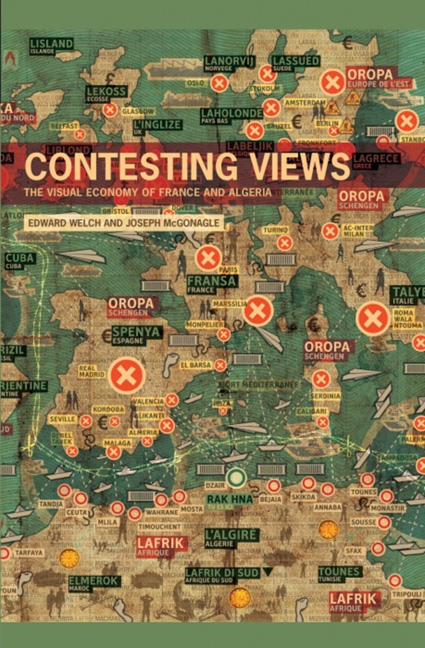Book contents
- Frontmatter
- Contents
- List of Illustrations
- Acknowledgements
- Introduction: Visualising the Franco-Algerian Relationship
- I Algerian Pasts in the French Public Sphere
- II Mapping Franco-Algerian Borders in Contemporary Visual Culture
- 4 War Child: Memory, Childhood and Algerian Pasts in Recent French Film
- 5 Bridging the Gap: Representations of the Mediterranean Sea
- 6 A Sense of Place: Envisioning Post-Colonial Space in France and Algeria
- Conclusion
- Notes
- Bibliography
- Index
5 - Bridging the Gap: Representations of the Mediterranean Sea
from II - Mapping Franco-Algerian Borders in Contemporary Visual Culture
- Frontmatter
- Contents
- List of Illustrations
- Acknowledgements
- Introduction: Visualising the Franco-Algerian Relationship
- I Algerian Pasts in the French Public Sphere
- II Mapping Franco-Algerian Borders in Contemporary Visual Culture
- 4 War Child: Memory, Childhood and Algerian Pasts in Recent French Film
- 5 Bridging the Gap: Representations of the Mediterranean Sea
- 6 A Sense of Place: Envisioning Post-Colonial Space in France and Algeria
- Conclusion
- Notes
- Bibliography
- Index
Summary
During French colonial rule in Algeria, the Mediterranean Sea and wider region played an important role in helping suture, metaphorically, the métropole's southern shores to Algeria's coastline. French colonial scholars, for example, positioned the Mediterranean region as the historical cradle of human civilisation and a crossroads of cultures linked by a shared Latin Mediterranean heritage. The historical links claimed between Algeria's Berber population and metropolitan French society here proved pivotal, positioning Berbers as ‘not only the privileged inheritors of Latin civilisation, but also the true homo mediterraneus’ because they were considered ‘the original inhabitants of North Africa, who had preserved more than any other people their Mediterranean identity’ (Silverstein 2004: 64). Emphasising a common Latin and Mediterranean heritage shared by French and Berber society allowed imperial France both to reconnect with its classical past and to present Islam as an impediment to trans-Mediterranean unity. Furthermore, by excavating Algeria's Roman past, and marginalising the contributions of other cultures and societies, European rule in North Africa was presented as part of a wider historical continuity, which helped justify French colonisation (Lorcin 2002).
Therefore, as Dine (2009: 20) argues, ‘the French colonial myth of a pan-Mediterranean civilization constitutes a privileged site for the exploration of the ideological and indeed psychological landscape of Algérie française’. Moreover, as the prominence of coastal landscapes in the images discussed in Chapter 1 made clear, tethered to this psychological landscape was the Mediterranean Sea. This might explain why expressions such as ‘La Méditerranée traverse la France comme la Seine traverse Paris’ came to gain currency during French colonial rule, positioning the Mediterranean Sea as ‘nothing more than an internal waterway in the ideological discourse of supporters of Algérie française’ (Majumdar 2007: xxv). As Weber (1986) notes, it was only after Algerian independence that the hexagon gained wide currency as a figuration of metropolitan France in public discourse, further confirming the Mediterranean Sea's pivotal role in sustaining notions of French identity prior to major decolonisation.
- Type
- Chapter
- Information
- Contesting ViewsThe Visual Economy of France and Algeria, pp. 121 - 144Publisher: Liverpool University PressPrint publication year: 2013



